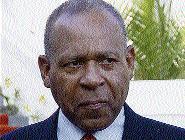
MANNING Linda Jafar-Hutchinson, Business Writer
Patrick Manning will raise with Hugo Chavez, the possibility of sourcing natural gas from Venezuela to be refined by Trinidad and exported to Jamaica, as Port of Spain explores options for keeping to the supply pact it signed with Kingston three years ago.
"In the discussions with the Jamaicans, no options were excluded," Trinidadian prime minister Manning said at a press conference Tuesday on preparations by his party to contest the general elections, expected this year.
Manning who will be meeting with Venezuelan president Chavez later this month in Caracas said he will raise the issue then.
He maintains that sourcing LNG supplies from Trinidad's, Atlantic LNG, remains under consideration.
"You may or may not be able to," he said. "that's just another option that can be explored."
Jamaica and Trinidad and Tobago signed a memorandum of understanding in 2004 for the supply of 1.1 million tones of LNG per annum over a 20-year period for use by the Jamaican aluminium company (Jamalco) and the Jamaica Public Service Company power plants.
At the meeting in Caracas, Manning said he "imagines" energy will top the agenda - a reluctant admission that the shift in market dynamics under the Venezuela/Caricom PetroCaribe agreement, which he initially vilified, has seen Trinidad supplanted by Venezuela as the dominant oil force in the Caribbean.
A critical issue
"We are not driven by ego, but we are driven by the need to get the work of the people done in the Caribbean. It is a critical issue. And if it requires my going to Venezuela to have it settled, I will do that," said Manning, noting that a discussion of energy security and the dominant supplier's role in policing it, was warranted.
Trinidad and Tobago's state-owned oil company Petrotrin said it remains the dominant oil supplier in the Caribbean, for now, but acknowledged it was being squeezed out by the PetroCaribe oil facility, which offers soft financing on petroleum to Caricom markets.
Jamaica gets 21,000 barrels of crude per day under the agreement.
Petrotrin's executive chairman Malcolm Jones said it was only a matter of time before Caracas assumes dominance.
In a review of its 2006 performance, Petrotrin which produces 160,000 barrels of oil a day, said it expects to see a sizeable loss of revenue in the short to medium term and needs to urgently mount an effective response to ensure its survival, saying it cannot depend on a capricious marketplace.
Manning is also expected to raise at the Caracas meeting, the issue of accessing natural gas it shares on the maritime border with Venezuela, the source from which it hopes to draw for a new gas pipeline, dubbed Train X.
After four years of negotiations, the neighbouring countries have agreed to share the natural gas reserves in the Loran Field/Platforma Deltana believed to bottle about 10 trillion cubic feet of natural gas, about 7.3 trillion of which will go to Venezuela.
Manning also suggested it was time for new oil talks in the region, saying the issue was raised at last weekend's Rio Summit in Georgetown, which he attended as a specially invited guest.
"Several heads talked about the energy deficit situation of Brazil, Chile, of Argentina, of Panama, and of Mexico. And, therefore, if you have countries that have energy deficits and there are countries rich in energy, especially natural gas, then there is the basis for discussions," he said.
business@gleanerjm.com

